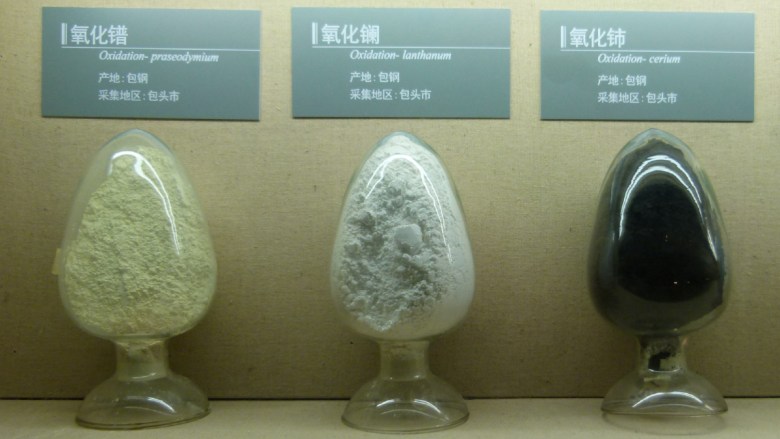Politics
G7 and EU Collaborate on Rare Earth Strategy Following China’s Export Controls

The Group of Seven nations (G7) and the European Union are actively collaborating to address their dependence on China for rare earth minerals. This initiative follows China’s recent decision to tighten export controls on essential minerals and related refinery technologies on October 9, 2023. In response, both entities are exploring the introduction of price floors to support non-Chinese rare earth suppliers and ensure their profitability.
On October 17, Canada’s Finance Minister François-Philippe Champagne emphasized that G7 nations possess the necessary resources to transition “from dependence to resilience” within the rare earth supply chain. He indicated that the group is poised to operationalize alternative supply routes. Meanwhile, EU Trade Commissioner Maros Sefcovic stated last week that the bloc is coordinating with G7 members to formulate a response to China’s export restrictions.
Upcoming G7 Meeting and Strategic Discussions
The topic of rare earth security, along with the proposed pricing strategy, is expected to be a focal point at the G7 Energy and Environment Ministers’ Meeting scheduled for October 30-31 in Toronto, Canada. The consensus reached during the G7 Summit in Kananaskis in June, which advocated for enhanced coordination on critical mineral supply chains, will underpin discussions in Toronto. Officials anticipate that this meeting may lead to the development of a concrete framework aimed at reducing reliance on Chinese exports.
In a related development, Australian Prime Minister Anthony Albanese and US President Donald Trump recently signed a rare earths agreement in Washington, solidifying Australia’s role as a key supplier in the US critical minerals chain. This deal also reinforced the Aukus security pact, which aims to collectively diminish dependence on Chinese resources.
Price Floors: Opportunities and Challenges
The concept of implementing price floors is not without precedent. In the United States, MP Materials, a prominent rare earth producer, benefits from a government-backed agreement that guarantees a minimum price of USD 110 per kilogram for neodymium-praseodymium (NdPr) oxide. This price is notably higher than China’s current price of USD 88 per kilogram, which aids in offsetting production costs and highlights Washington’s commitment to establishing a self-sufficient rare earth supply chain.
Despite these efforts, some Chinese commentators express skepticism regarding the effectiveness of the G7’s price floor strategy. A columnist writing under the pseudonym “Pianist under the Moonlight” argued that China’s dominance in the sector is bolstered by significant investment, economies of scale, and comprehensive processing capabilities that competitors find difficult to replicate.
The columnist cautioned, “If the price floor is set too low, no one will invest; if it’s set too high, downstream industries cannot afford it.” This sentiment reflects a broader concern that artificially inflated prices could inadvertently increase costs for electric vehicles, wind turbines, and consumer electronics, ultimately impacting consumers.
Moreover, industry insiders, including German automakers, may resist aggressive price-floor policies, fearing that such measures could disrupt their operations and lead to increased lobbying for exemptions or subsidies.
In a historical context, the situation mirrors past events when China limited rare earth exports to Japan in 2010, prompting complaints from the US, EU, and Japan to the World Trade Organization. The subsequent reactivation of US-based Molycorp’s Mountain Pass mine and Australian firm Lynas’s expansion efforts illustrate the complexities of the rare earth market. However, after losing a WTO case in 2014, China significantly increased its market share, leading to price declines that adversely affected global producers.
As tensions escalate in the global economic landscape, China’s recent actions, including the removal of veteran negotiator Li Chenggang—known for his assertive diplomatic style—indicate a shift in approach. His dismissal follows remarks made by US Commerce Secretary Scott Bessent regarding Li’s confrontational comments during a previous uninvited visit to Washington.
In a media briefing, Bessent characterized China’s export restrictions as a decisive escalation in global economic tensions, framing the standoff as a significant moment in international trade. “This is China versus the world,” he stated, emphasizing a commitment to preventing external control over global supply chains.
The Chinese Commerce Ministry responded, asserting that their new rare earth export restrictions are legitimate measures aimed at preventing misuse in weapons of mass destruction. Spokesperson He Yongqian maintained that China had communicated its plans to the US, EU, and Japan prior to implementation.
As the G7 and EU work towards reshaping their rare earth strategies, the implications for global supply chains and international relations remain profound. The upcoming meetings in Toronto may set the stage for significant developments in how these nations navigate their reliance on critical minerals in an increasingly interconnected world.
-

 Business5 months ago
Business5 months agoKenvue Dismisses CEO Thibaut Mongon as Strategic Review Advances
-

 Lifestyle4 months ago
Lifestyle4 months agoHumanism Camp Engages 250 Youths in Summer Fest 2025
-

 Sports4 months ago
Sports4 months agoDe Minaur Triumphs at Washington Open After Thrilling Comeback
-

 Sports5 months ago
Sports5 months agoTupou and Daugunu Join First Nations Squad for Lions Clash
-

 Top Stories5 months ago
Top Stories5 months agoColombian Senator Miguel Uribe Shows Signs of Recovery After Attack
-

 World5 months ago
World5 months agoASEAN Gears Up for Historic Joint Meeting of Foreign and Economic Ministers
-

 Health4 months ago
Health4 months agoNew Study Challenges Assumptions About Aging and Inflammation
-

 Business5 months ago
Business5 months agoOil Prices Surge Following New EU Sanctions on Russia
-

 Entertainment4 months ago
Entertainment4 months agoDetaşe-Sabah Violin Ensemble Captivates at Gabala Music Festival
-

 Entertainment4 months ago
Entertainment4 months agoBaku Metro Extends Hours for Justin Timberlake Concert
-

 Top Stories5 months ago
Top Stories5 months agoRethinking Singapore’s F&B Regulations Amid Business Closures
-

 Business5 months ago
Business5 months agoU.S. House Approves Stablecoin Bill, Sends to Trump for Signature









